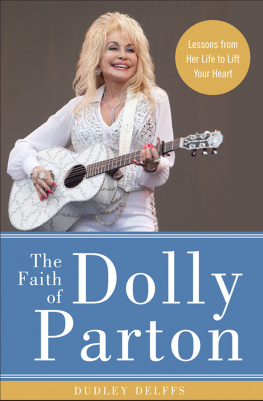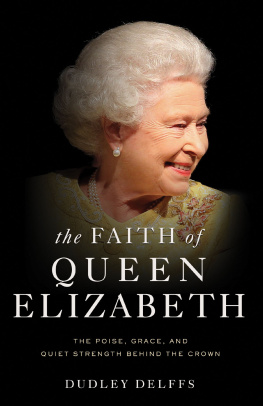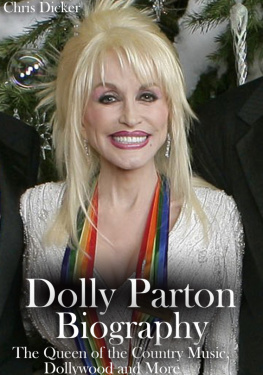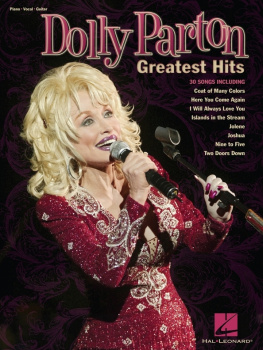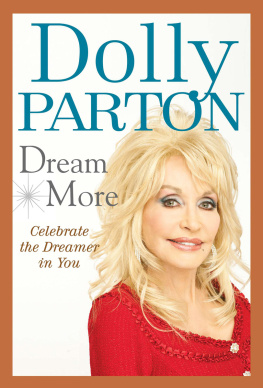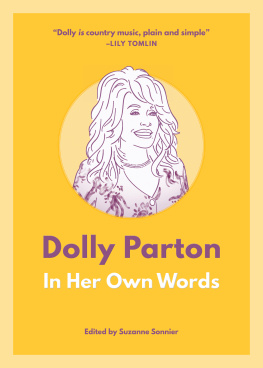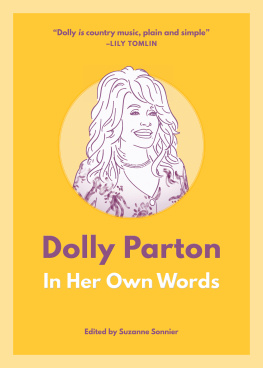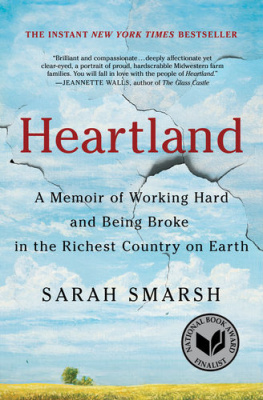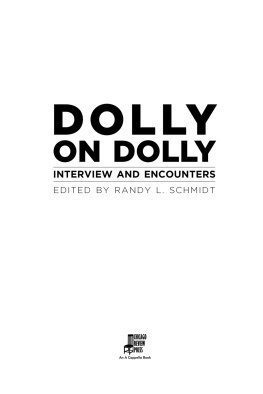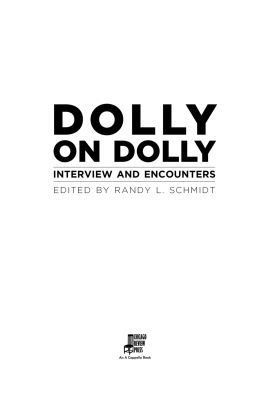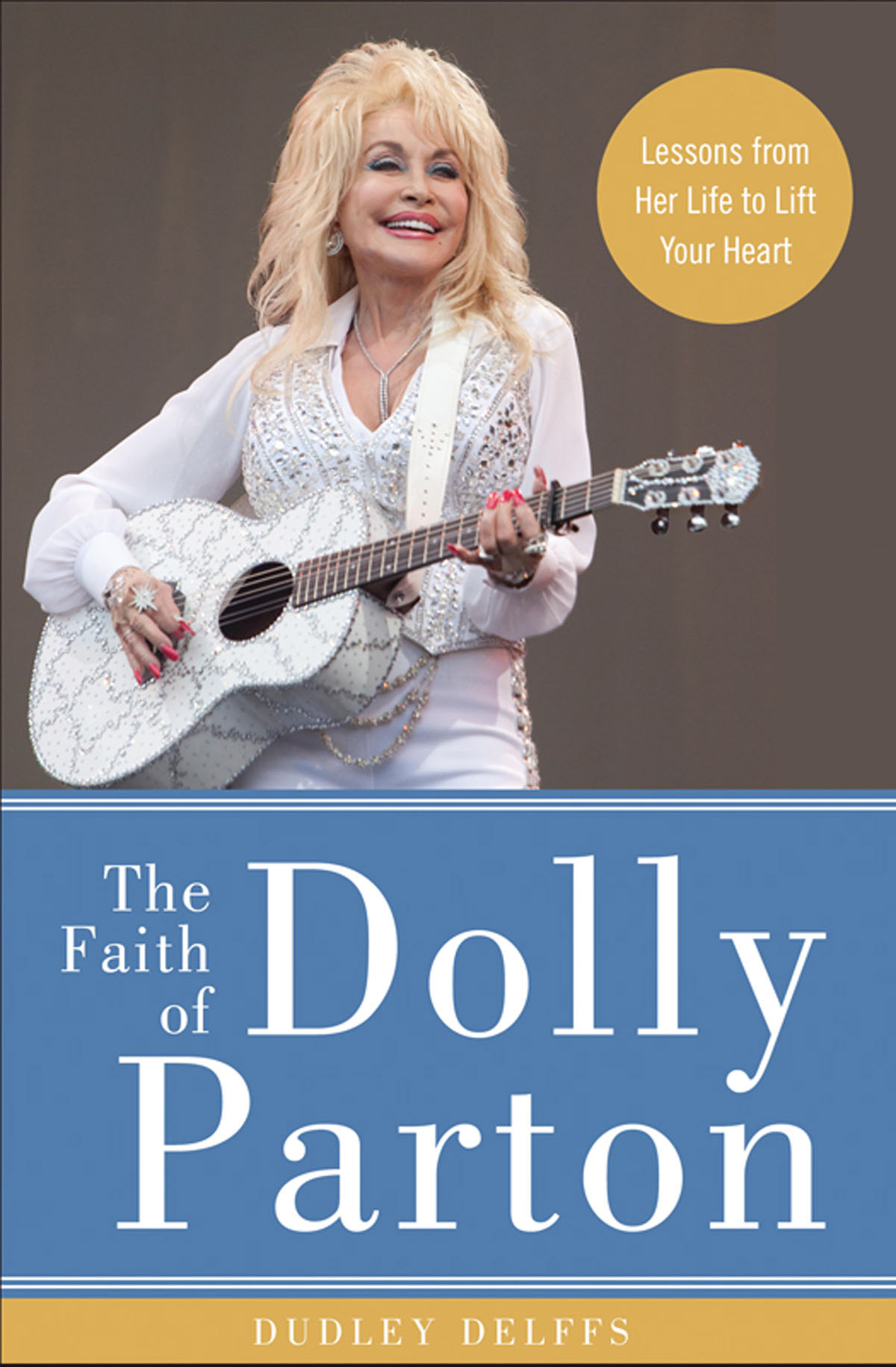Contents
Guide
In the midst of the direst poverty and despair, the human spirit, especially that of children, will find some hope to cling to, some promise of a better day.
DOLLY PARTON
I ll never forget the first time I saw Dolly Parton.
I was probably about six at the time, sprawled on the carpet of our family roomthe den as we called itarranging green army men among plastic farm animals and Matchbox cars while my parents watched shows on the large oak-veneered RCA console angled in the corner. Our viewing skewed toward my fathers favorites or shows considered appropriate for our family, which basically meant me, as the only kid in the house and my parents only child together.
The same shows always seemed to be on: staples like The Andy Griffith Show and Gunsmoke, along with Bonanza, Mannix, and Hawaii Five-O. Two country music shows, however, stood out: The Porter Wagoner Show and Hee Haw. While my father loved country music, these programs didnt interest me much. Some of the music was okay, even good sometimes, but the country cornball humor annoyed me.
I couldnt put my finger on it at the time, but the corny jokes and predictable routines puzzled me. They were goofy and silly, playing up the stereotypes that even as a kid I found over-the-top and limiting, if not insulting. My father tended to laugh, especially if he was on his third or fourth drink, and my mother would grin or chuckle, usually following his lead.
Despite my usual disinterest in what my dad was watching, one person on The Porter Wagoner Show always drew my attention. I know its easy to assume that I was fascinated by her extraordinary figure and frothy blonde hair sculpted like cotton candyand maybe I wasbut there was something special about Dolly Parton. I couldnt have put it into words then, but it was more than just the fact that she was young and pretty and had big breasts. It was even more than her beautiful voice that reminded me of birdsong, sometimes bright and chipper like a robin and other times as lonesome and sad as a whip-poor-will.
Yes, Dolly hadfor lack of a better wordpresence, that mysterious star quality exuding from certain people who seem more alive, more aware, more positive, basically, just more. Many of these larger-than-life people are entertainers, performers, and celebrities, but many wait tables, manage retail stores, or repair computers. I suspect Dolly would still be Dolly even if she were a bank teller, a soccer mom (now theres an image!), or an attorney.
Whether performing a duet with Porter or pretending to be a dumb blonde in a hillbilly skit, Dolly seemed both smart and sincere. She didnt mind poking fun at country stereotypes because she was in on the joke. She was self-aware enough to deliver her punch lines with that tinkling-bell laugh of hers and then emotionally intense enough to beg Jolene not to take her man and mean it. The fact that she wrote many of her own songs only reinforced my impression that she was not like every other performer or country music singer.
Simply put, Dolly was special.
Humble Beginnings
Dollys origins have become the Smoky Mountain mythology her brand is built on. She has always joked about it (Sure we had runnin waterwhen wed run and get it!), but the reality must have been severe. Working their small farmstead from a two-room cabin in the shadow of the Great Smoky Mountains, her parents, Lee and Avie Lee Parton, focused on keeping food on the table and a roof over the heads of their growing family. They were so poor that the local doctor who delivered Dolly, Dr. Robert Thomas, received a pound of cornmeal as payment.
One of Dollys earliest biographers, Alanna Nash, then a journalist for Country Music Magazine, visited the old Parton cabin and wrote: No matter how many pictures you have seen or how much you have fantasized about it, you are not prepared. It is the most extreme rural poverty imaginabledirer even than Dolly has painted itand as you stand there gazing at the ancient washing machine on the porch and the inoperative still off to the side of the house in front of the rusted automobile parts, and the scraggly chickens, you feel guilty for having wondered if Dolly has exaggerated her humble origins.
Dollys father raised a bit of tobacco as a cash crop, tended the familys vegetable garden, and worked construction and odd jobs in nearby Sevierville and Knoxville to keep his family going. Mama Parton stayed home with their young children, keeping them all clothed and fed while often expecting their next one. Early on she disguised their poverty through her imagination, teaching Dolly and her siblings how to make stone soup, turning a meager broth with potatoes and a few vegetables into a magical meal.
By virtually all accounts, little Dolly was a happy, carefree child, usually running barefoot in the swept, dirt-packed yard, chasing after chickens or listening to her mama tell Bible stories from their tiny porch. She had older siblings to play with and younger ones to chase after. Nonetheless, as the fourth of twelve children, Dolly also realized early on that her parents simply didnt have the time or energy to devote to each childs specific preferences, talents, and personality. [Daddy] and Mama had so many kids that none of us got special attention. But what they did have, shes always quick to add, is plenty of love. Dolly and her siblings knew what being in a loving family was all about.
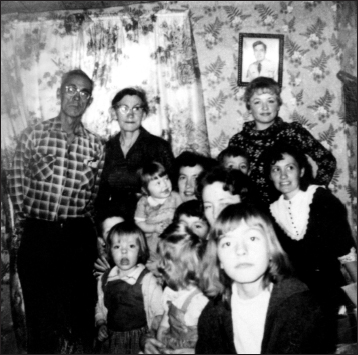
Nancy Barr/Mediapunch/REX/Shutterstock
Photograph of Dolly (upper right in the back) and family at Christmas in 1960
And Dolly quickly found a way to stand out. Music became her natural means of self-expression, a shared language that commanded the attention of her family, friends, and neighbors. Whether at home doing chores, worshipping at church, or performing at school, Dollys sunny smile and crystal clear voice could not be ignored.
Even before she was born, Dolly was surrounded by music. Her mother frequently sang hymns and old mountain folk songs to her children while cooking, doing chores, and sewing by the fire. Her maternal grandfather, Reverend Jake Owens, was a Pentecostal preacher, so Dolly was exposed to more hymns and church music in the tiny mountain church where he preached. She was singing in church by age six and playing guitar by age seven.
And it wasnt just to get others attention. Writing songs and singing them was as natural to Dolly as breathing in the fresh mountain air. Shes made up little melodies for as long as she can remember, with Little Tiny Tasseltop, a song about a beloved corncob doll her mama made for her, being the first song she ever wrote. Young Dolly noticed the natural rhythms around her while growing upthe two notes of a bobwhite, the sound of her mother snapping beans, the tap-tap-tap of a spoon on a cupand found herself humming and riffing throughout the day.
Dolly knew she loved music and never thought about whether it was practical. With the joyful assurance of a child doing something she loves, Dolly never questioned her attraction for words set to music. She just seemed to know that songs and singing were part of who she was, part of who God made her to be.
Dolly enlisted her siblings, especially her sisters, to join in her performances too. She even jokes that her sisters were musically abused by Dollys attempts to make them her backup singers. But she would perform even when she couldnt find an audience, well, at least a human audience. In her autobiography,

